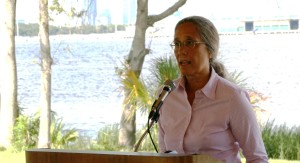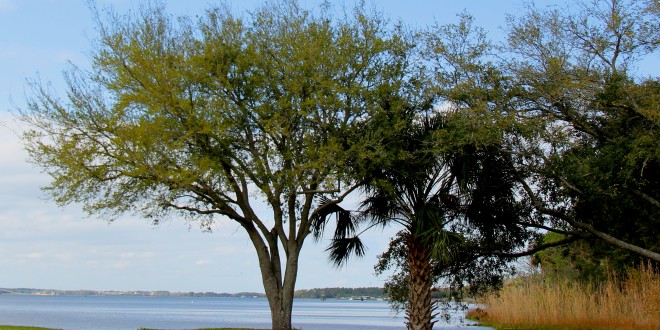The eighth annual State of the River Report on the lower St. Johns River Basin shows there are positive signs of the waterway’s health improving, but reveals there are concerns of deterioration, as well as some indicators—some good and some unsatisfactory—that haven’t changed much over the years.

“Our study reveals some improvement in the river’s health as well as the importance of continued monitoring of the river and its ecosystem,” said Dr. Radha Pyati, chair and professor of chemistry at the University of North Florida.
Some of the trends from the latest report showing improvement in the river’s health include lower nitrogen levels, a decline in fecal coliform, improvement in turbidity—a key test of water quality—and the drop in phosphorus levels in the estuarine and saltwater sections. There are also some positive trends that haven’t changed much over the years, including generally healthy and stable fisheries as well as stable threatened/endangered species.
On the down side, many other indicators of health aren’t improving or their status is unclear. “Submerged aquatic vegetation and wetlands, critical to other aquatic life, are highly vulnerable to salinity changes and they should be carefully monitored and better understood in the Lower St. Johns River,” said Dr. Lucinda Sonnenberg, director of the Millar Wilson Laboratory for Chemical Research and research professor of chemistry at Jacksonville University.
One indicator that the river’s health has deteriorated over the years is the increase in overall surface water discharges of toxic chemicals. Some other unsatisfactory indicators include contaminated sediments, high levels of phytoplankton, including algal blooms with potentially harmful levels of cyanobacteria toxins, and fish consumption advisories due to mercury. Non-native species continue to be a problem, including emerging concerns of lionfish, Japanese climbing fern and Cuban treefrogs.
A presentation by Pyati and Sonnenberg on the findings will take place Friday, Aug. 14, at the opening session of the 2015 Environmental Symposium, titled “City of Jacksonville—50 Years of Environmental Stewardship,” scheduled from 8 a.m. to 5 p.m. at the Adam W. Herbert University Center, Building 43, in the Grand Banquet Hall, Room 1044, on the UNF campus. The River Report and a brochure, a quick reference guide on river health and ways the public can help the river will be available at www.sjrreport.com the same day.
The annual symposium, sponsored by the Environmental Protection Board of the City of Jacksonville and the UNF Environmental Center, brings together members of the community to interact with the regular agencies responsible for developing and implementing environmental policy.
The State of the River Report is a collaboration among UNF, JU and Valdosta State University and is supported by the Environmental Protection Board. UNF River Report team members include Pyati, Dr. Stuart Chalk, associate professor of chemistry; Dr. Brian Zoellner, assistant professor and Graduate Program director; and Dr. Peter Bacopoulos, assistant professor of civil engineering. JU team members include Sonnenberg; Dr. Nisse Goldberg, associate professor of biology/marine science; Dr. Gerard Pinto, research scientist; and Dr. Anthony Ouellette, associate professor and co-chair of the Biology Department. The Valdosta State University team member is Dr. Gretchen Bielmyer-Fraser, associate professor of biology.
The Marine Science Research Institute at Jacksonville University is the premier biological and environmental research and education facility on the St. Johns River. The two-story, 32,000-square-foot “certified-green” building has classrooms, laboratories, offices for the St. Johns Riverkeeper and the Florida Fish and Wildlife Conservation Commission, and areas for teaching Duval County public school students. For more information, visit www.ju.edu/msri.
The mission of the UNF Environmental Center, founded in 2004, is to establish, develop and support cross-disciplinary education and research related to the environment. The center fosters programs for students, faculty and staff to pursue environmental activities through academics, research and extracurricular activities. For more information, visit http://www.unf.edu/ecenter/.
 Wave Magazine Online Jacksonville University News Hub
Wave Magazine Online Jacksonville University News Hub
